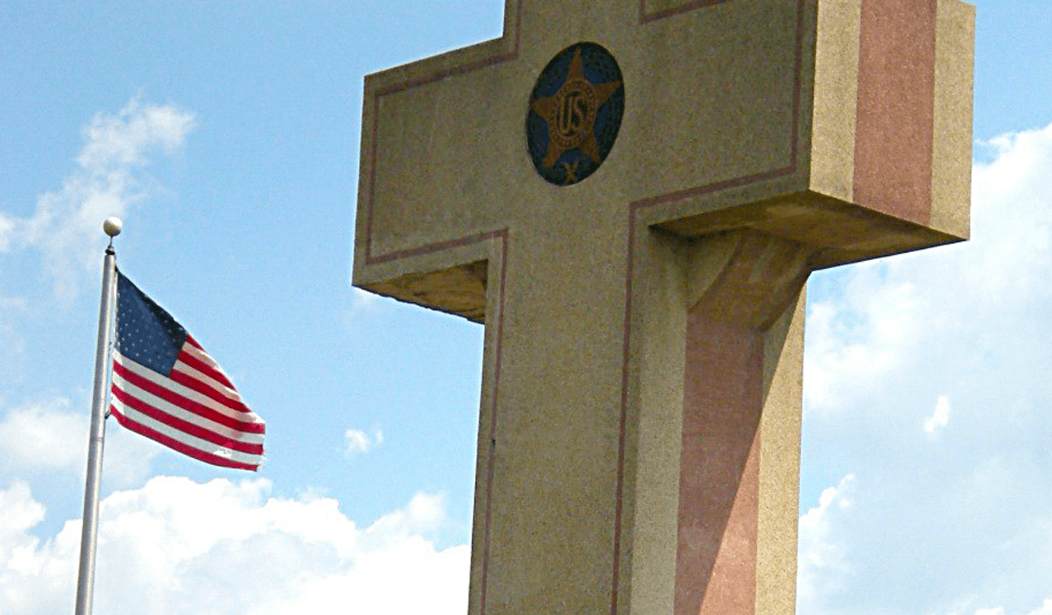On Wednesday, the Fourth Circuit Court of Appeals declared a World War I monument in the shape of a celtic cross unconstitutional, saying it “breached” the separation of church and state. The Bladensburg World War I Veterans Memorial has stood since 1925, honoring the 49 Bladensburg-area men who gave their lives during World War I. The American Humanist Association sued to have it removed in 2014.
“The decision ignored the fact that the monument was modeled off of World War I grave markers, thousands of which are in the shape of a cross like this one,” Ken Klukowski, senior counsel at First Liberty Institute, told PJ Media. First Liberty, along with Jones Day, represents the American Legion, which first erected the monument.
Despite the historical meaning and resonance of the cross-shaped marker, which harkens back to World War I gravestones, the American Humanist Association argued that the cross violated the First Amendment’s Establishment Clause, which bars Congress from making any law “respecting an establishment of religion.”
Klukowski argued that this is a misinterpretation of the Establishment Clause. “Current Supreme Court precedent holds that the Establishment Clause is violated only by government actions that officially adopt a religion as that concept was understood by the Constitution’s framers, or when the government coerces someone to engage in a religious activity,” he said.
“A passive display like this was historically accepted, and coerces no one,” the lawyer explained. “Moreover, in the Supreme Court case most similar to this case, the Court allowed a longstanding Ten Commandments display on public land to remain in place.”
In Van Orden v. Perry (2005), the Supreme Court ruled that a Ten Commandments display at the Texas State Capitol in Austin did not violate the Establishment Clause.
Klukowski argued that the Fourth Circuit’s decision “jeopardizes many longstanding memorials and monuments across the nation, including even Arlington National Cemetery.”
Perhaps because it is so important, eight Republican and Democratic members of Congress filed a joint amicus brief in support of the memorial. Sen. Joe Manchin (D-W.Va.) joined Representatives Doug Collins (R-Ga.), Vicki Hartzler (R-Mo.), Jody Hice (R-Ga.), Evan Jenkins (R-W.Va.), Jim Jordan (R-Ohio), Mark Meadows (R-N.C.), and Alex Mooney (R-W.Va.).
Even so, Judge Stephanie D. Thacker, who wrote the majority opinion for the panel, asked what a “reasonable objective observer” would think about the memorial. In a vacuum, she argued the observer would perceive the cross as an enormous endorsement of the Christian faith.
Both Thacker and Judge James A. Wynn Jr., who joined her in ruling against the monument, were appointed by President Barack Obama.
“It’s a cross much more clearly and obviously than a memorial, David Niose, a lawyer for the humanist association, told The Wall Street Journal.
Judge Roger L. Gregory, the chief judge of the circuit appointed by President Bill Clinton, dissented, arguing that a reasonable observer would view the cross as less a promotion of Christianity than a historical monument.
“The American Legion’s commitment to preserving the Bladensburg Memorial has been unwavering,” Kelly Shackelford, president and CEO of First Liberty, said in a statement. “Their determination is appropriately illustrated by President Woodrow Wilson’s words engraved at the memorial’s base: ‘The right is more precious than the peace; we shall fight for the things we have always carried nearest to our hearts; to such a task we dedicate ourselves.'”
Reinterpreting this memorial as an endorsement of Christianity, rather than a tribute to the men who gave their last full measure of devotion in World War I, is an insult to their sacrifice and a gross twisting of history.
“This memorial has stood in honor of local veterans for almost 100 years and is lawful under the First Amendment,” said Michael Carvin, lead counsel for The American Legion and partner at Jones Day. “To remove it would be a tremendous dishonor to the local men who gave their lives during The Great War.”
Perhaps if the American Humanist Association took a moment to reflect humbly on the meaning of the monument and its historical context, they would not be so quick to disrespect the soldiers who fought for their freedom.









Join the conversation as a VIP Member